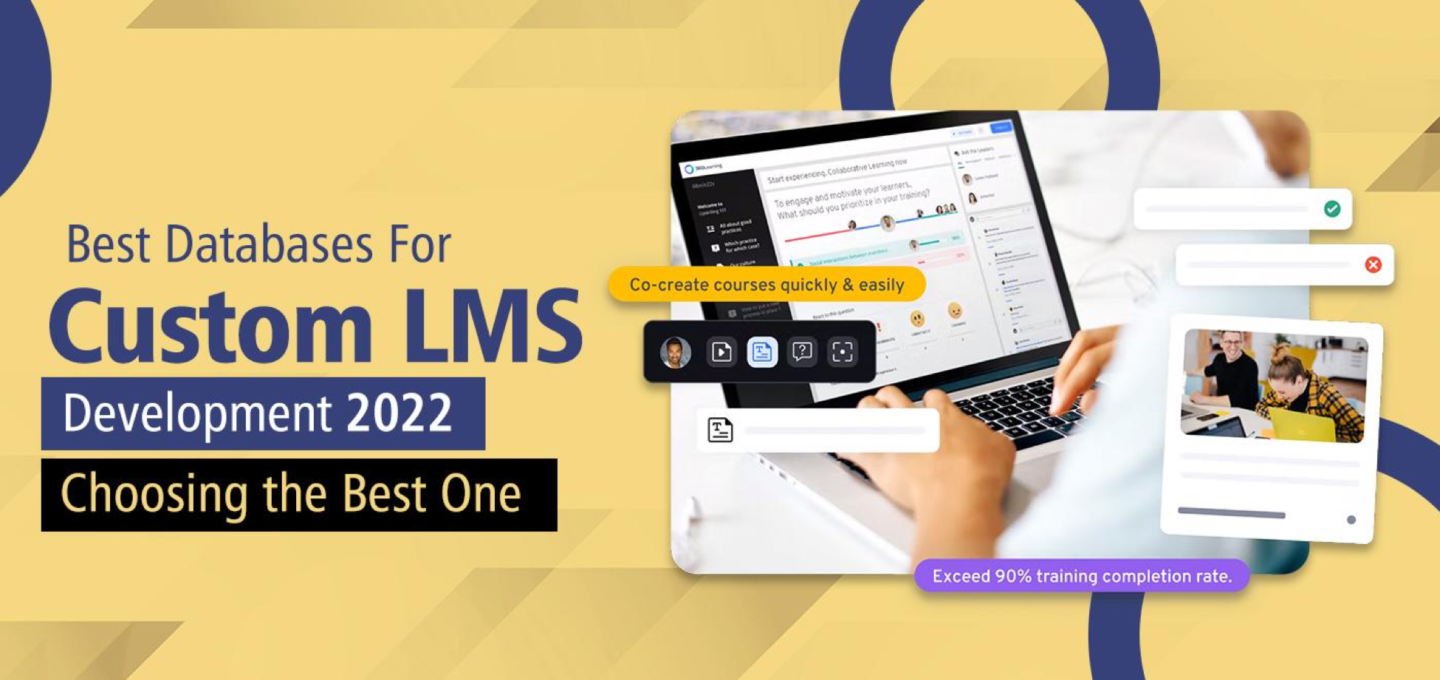
Learning and healthcare are the two domains that are never going to fade away. Enterprises in the field can easily second that statement as they too learned it the hard way during the pandemic. While everything was shut, these two were the only domains that sustained. Healthcare is something that goes beyond earning, however, when it comes to learning and education, there is a great potential for enterprises to break into a profitable business by moving towards the eLearning model. Yes, eLearning is the future and has already helped the entire world during tough times. Looking at the need of the hour, there are so many tools that are nothing less than a boon. One such tool is a learning management system. An LMS is the basic need of an eLearning platform or any other online learning and training platform. It helps in managing a lot of things including student data, instructor data, learning content, schedule, interactive sessions, and whatnot.
With the help of an LMS, there have been hundreds of organizations that have been able to service the lockdown and that was just the beginning. With the help of a reliable LMS development company, an organization can automate the entire process forever which can help a lot in reducing the cost of usage as well as other aspects such as infrastructure, offline learning material, electronic costs, etc. Other than cost-saving the tool is also helpful in generating deep insights on how the courses or the students are performing on your platform which helps in taking important decisions based on the data and analysis of that data.
Overall, a learning management system is a win for those who are looking for a centralized solution to all their learning and training solutions. The primary users of one such tool are eLearning platform owners as well as enterprises and companies that have employee training and development programs. Software of such stature requires a thorough development process. So many questions such as what type of tech stack to be used? What will be beneficial for the system? Etc. are prominent while dealing with the development process. One prominent question is which is the best database forcustom LMS developmentin 2022.
In this post, let us explore the types of databases available to use in the process and try to understand which among the options will be the best one for your needs.
What is the Importance of Choosing the Correct Databases in an LMS?
A database is something that no other component can replace. For once you can manage without an LMS however if you deal with a large number of users, you are already using some type of a database. The storage of data generated and collected by the software is known as its database. It is the most important component of a learning management system as it helps you keep track of all the information related to your students, instructors, finances, courses, and everything else that can be found in the system. There are so many roles that a solid database plays in the success of an LMS.
You see, whenever you feed anything in the LMS, it requires a place to stay. Not only that, your LMS must know where that information is and must be easily accessible to it. After all, LMS is a gold mine for data as it generates tons of insights. Everything, from a student’s name and date of birth to the hours that they spend learning, everything is available on the LMS, and to keep that data documented, the database is needed. There are so many reasons that make choosing a database one of the most crucial decisions for developers. Some of them are –
- Data Security
Keeping the data secure is one of the biggest challenges for today. While there is basic information about an individual which is usually kept in the LMS, there are certain highly confidential factors that you need to keep safe. People enrolling on your platform expect data safety and hence if you have chosen the perfect database, you can stay relaxed about that.
- Easily Schedule Creation
When you have a database that your user interacts with, you easily learn the pattern that they work with and hence it becomes way easier to plan events and tests as per the response. Even in schools, with the help of a database in LMS, one can create an entire class calendar without thinking twice about being accurate or not as it is all digital and ready to roll. Services providing mobile learning solutions also take care of this feature and hence choosing a compatible database is always a priority.
- Assists in Performance Tracking
Whenever there are assignments and submissions, one of the biggest points of concern that professors have is how they will track individual performances. Sure one can grade and note but year after year that data can become confusing and hence you need a solid database. You can simply create fields in front of the name of students and keep all the data that you wish to use or keep. This way, you have clarity on which student has improved and whose performance has declined.
- Keeps Track of Distributed resources
If you are a school or any learning institute, you have to provide assets to your students to bring the best out of them. There are so many resources that an organization deploys just for the benefit of the user, in this case, students and faculty. You can easily keep track of the resources that you have shared with the students as well as assets given to faculties. This way you are always aware of the shortcomings and extra availability of the resources.
- No Data Loss Issue
When you have a solid database integrated with your LMS, the chances of you losing your data become negligible. You see, transferring, updating your platforms and other activities can result in loss of data however when you have a database with regular backups and storage, there are zero chances of data loss. Even if something happens, everything can be easily restored by a back up which makes the use of a reliable and the best database crucial for the businesses. That is also why people prefer taking LMS integration services for overall data security and management.
Which is the Best Database for Custom LMS Development? How to Choose?
Now that you are familiar with the important nature of using a reliable database while creating a robust LMS you might have got a question related to choosing the database. Which is the best database for custom LMS development? How to choose the best for your needs as there are several options available in the market and you do not want to miss out on the best one, now do you? Well, to reduce your chances of getting confused while choosing an appropriate one, we have shortlisted the 3 best databases with their use cases so that you can choose from them and make the most out of your custom learning management system. Take a look –
- MongoDB – One of the most advanced and popular database management systems, MongoDB is a great choice for creating an LMS or a virtual learning environment. The entire deployment process is smooth for the developers and the best part is that it offers great scalability. MongoDB is also considered a time-saving database as it does not require the DBA time and the developers can start working on the applications immediately. That gives the process a boost in terms of reducing the development time. Not to forget MongoDB supports commodity hardware which means it is much easier and pocket-friendly to scale out when required. If you aim to take your current system to a larger scale. MongoDB can be the best way to do so.
- MySQL – The most commonly used database for LMS development, MySQL is an open-source database that brings tons of flexibility onboard. There are so many integrations that you may or may not need in your learning management system and with the help of open-source plugins you can get a lot of productivity onboarded to your LMS. Using MySQL is also advised as the skilled developers are easily available which reduces the development cost. Being a client-server database, it is a very responsive relational database which means you get faster fetching and a much simpler experience while using the database. If simplifying the process without spending tons of money, or if there is a budget constraint in your project, using MySQL is technically an ideal solution for you.
- PostgreSQL – If you have the aim to go for the cutting edge technology in other domains of your development process, going with PostgreSQL is a great option for you. It is a diversified database which means it can fit in with different tech configurations. It is highly adaptive and the best part is it is open source. You get to tweak it as per your development requirements. It is considered an advanced ORDBMS for your LMS which means you can rely on the robust nature of this sort of database. Also, those who are thinking of going towards Microsoft SQL (MSSQL) can use this instead as it has all the features along with ANSI SQL Standard compliance. This means at all fronts, getting your LMS connected with a PostgreSQL is a good decision.
Parting Words
There are other honorable mentions such as – Oracle & MSSQl However, you need not get confused as the above mentioned are the finest names in the industry and there can hardly be any sort of database that can be compared to these as they have all the features that you may want. For power and scalability go for MongoDB, for flexibility and lower cost, go for MySQL and an overall performance-based highly functional database, go with PostgreSQL. This brings us to the end of this post, hope you got a good clarity on why choosing the best database is important and which is the best database for custom LMS development. In case you need more in-depth info, you always have the option of taking LMS consultingservices for better clarity. Good luck & thanks for reading!
Author Bio Alicia is a technical content writer and is associated with A3logics for over a couple of years. She has been in touch with the Mobile App Development team and is often found struggling with some unique topics for her upcoming projects. She is often found discussing the latest developments with the technical team. When not working on any of her writing projects, she is either reading any of the Agatha Christie mysteries or busy gardening.

















